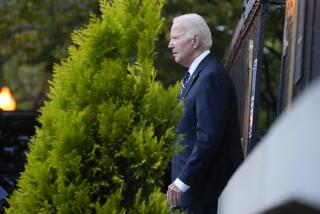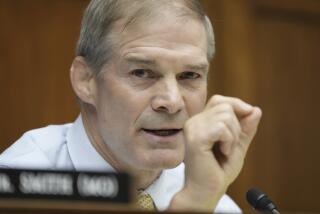Foley Seems to Be Leaning to Full Iran Hostage Probe : Congress: Speaker says staff raised ‘disconcerting’ questions on charge that Reagan campaign struck deal.
WASHINGTON — House Speaker Thomas S. Foley indicated Monday that he may soon decide whether to launch a formal congressional inquiry into allegations that the Reagan-Bush campaign struck a secret deal to delay the release of American hostages held by Iran until after the 1980 presidential elections.
A staff-level inquiry into the charges is now nearing completion, and Foley is under mounting pressure to follow that up with a full-dress investigation that would be empowered to subpoena witnesses and examine classified material presently unavailable to investigators.
Foley said he would decide within “the next two or three weeks” after consulting with other House leaders, both Democrats and Republicans. But the Washington Democrat, who in the past was characterized as being reluctant to order a formal investigation, suggested that he was now leaning toward one.
Foley said an informal but intensive monthlong inquiry by congressional staff aides had raised “disconcerting” questions that it would be “in everyone’s interest to attempt to resolve” through a more formal investigation.
Those questions center on charges by a number of sources that the late William J. Casey, who was then Ronald Reagan’s campaign manager and later became director of the Central Intelligence Agency, negotiated a secret deal to supply Iran with arms and ammunition in return for a delay in releasing the 52 hostages being held at the U.S. Embassy in Tehran until after the November elections.
At the time, Casey and other campaign officials were known to fear an “October surprise,” in which the hostages would be released just before election, thus reviving President Jimmy Carter’s receding chances of winning a second term in the White House.
The allegations, which were never proven, surfaced first in the wake of Reagan’s inauguration, when the hostages were freed, and later when clandestine shipments of arms from Israel to Iran became public. They resurfaced, and captured congressional attention, in April, when Gary Sick, a former Carter Administration official, said he had concluded after his own two-year investigation that the allegations were probably true.
“I don’t know of any evidence of misconduct on the part of the President,” Foley said Monday. “The question really centers around whether Mr. Casey, and possibly others, may have had conversations (with the Iranians) and what their effect was,” he said.
Foley said that, before a formal investigation is begun, the leadership would have to be convinced that at least “a reasonable possibility” of uncovering more information exists.
Foley’s caution reflects the dilemma that Democrats face on the eve of an election year. On the one hand, many Democrats are reluctant to associate themselves with a public inquisition that could backfire if it fails to turn up convincing evidence of wrongdoing. On the other hand, the allegations are so serious--and the circumstantial evidence apparently so interesting--that no one believes the matter can be put aside.
A senator mentioned as a possible Democratic presidential candidate in 1992 added his name Monday to the small but growing list of lawmakers agitating for a formal investigation.
“If the allegations are not true, the country needs to know they are not true,” Sen. Albert Gore Jr. (D-Tenn.) said in a floor speech in which he announced plans to introduce a resolution calling for a formal probe. “If they are true, the country needs to know that as well.”
More to Read
Get the L.A. Times Politics newsletter
Deeply reported insights into legislation, politics and policy from Sacramento, Washington and beyond. In your inbox three times per week.
You may occasionally receive promotional content from the Los Angeles Times.










